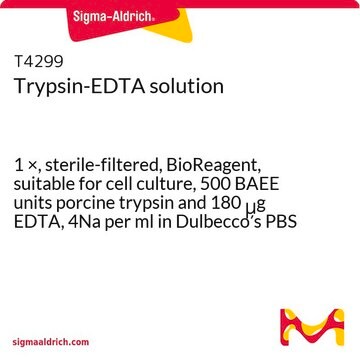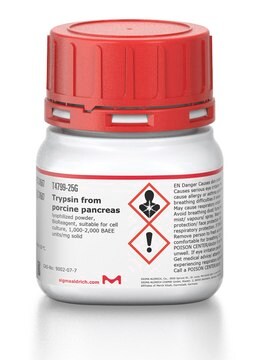SM-2004
Low Trypsin-High EDTA
PBS Based, 0.025% Trypsin & 0.75mM EDTA (1X), without Ca 2+ & Mg 2+
Synonym(s):
Low Trypsin-High EDTA Solution, PBS-Based Trypsin Solution, Trypsin-EDTA PBS
About This Item
Recommended Products
Product Name
Low Trypsin-High EDTA, PBS Based, 0.025% Trypsin and 0.75mM EDTA (1X), without Ca2+ and Mg2+, The Low Trypsin-High EDTA, PBS Based, 0.025% Trypsin & 0.75mM EDTA (1X), without Ca 2+ & Mg 2+ is available in a 100 mL format.
Quality Level
form
liquid
manufacturer/tradename
Specialty Media
input
sample type: human embryonic stem cell(s)
sample type induced pluripotent stem cell(s)
sample type epithelial cells
sample type hematopoietic stem cell(s)
sample type mesenchymal stem cell(s)
sample type neural stem cell(s)
sample type pancreatic stem cell(s)
sample type: mouse embryonic stem cell(s)
sample type cardiac stem cell(s)
Application
- as an incubating medium for single-cell preparation of human islets
- in the preparation of mouse embryonic fibroblast cells stock for conventional gene targeting
- to trypsinize human umbilical vein endothelial cells (HUVECs) for coating the beads with HUVECs
Storage and Stability
Disclaimer
Storage Class Code
12 - Non Combustible Liquids
WGK
WGK 1
Flash Point(F)
Not applicable
Flash Point(C)
Not applicable
Certificates of Analysis (COA)
Search for Certificates of Analysis (COA) by entering the products Lot/Batch Number. Lot and Batch Numbers can be found on a product’s label following the words ‘Lot’ or ‘Batch’.
Already Own This Product?
Find documentation for the products that you have recently purchased in the Document Library.
Our team of scientists has experience in all areas of research including Life Science, Material Science, Chemical Synthesis, Chromatography, Analytical and many others.
Contact Technical Service





